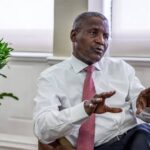The Federal Government is touting early wins from its economic reform agenda, pointing to improved financial conditions at the subnational level and a notable reduction in public debt.
Speaking in Abuja during a visit from the World Bank’s new Country Director for Nigeria, Mr. Matthew Verghis, the Minister of Budget and Economic Planning, Senator Abubakar Bagudu, outlined some of the measurable impacts of the reform program.
According to a statement by Mrs. Julie Osagie-Jacobs, Director of Information and Public Relations at the ministry, the minister remarked that the reforms are “progressing as planned,” with state and local governments experiencing a significant upswing in revenue. He added that there had also been a “substantial debt reduction.”
Expressing gratitude to the World Bank for its ongoing partnership, Bagudu pointed to the latest Nigeria Development Update as a reflection of the country’s economic progress. “We aim to grow the economy to $1 trillion,” the minister said, while stressing the importance of a “clear strategy” to push growth into double digits.
He also emphasized that widespread backing from political actors, labour unions, and the private sector would be vital to ensure the reforms remain on course.
Backing up the federal claims, the National Orientation Agency recently revealed that 33 states and the Federal Capital Territory had managed to trim their debt burdens, collectively repaying around N1.85 trillion in domestic debt between June 2023 and December 2024.
The NOA attributed this achievement to the Federal Government’s decision to remove petrol subsidies and allow the naira to float—moves that, though controversial, have boosted state revenues.















Leave a comment